India has been calibrating its testing strategy as per the changing paradigm, and taking into account the scope, need and capacity to rapidly scale-up tests performed each day across the country. Over a period of five months, the number of laboratories in the country rose from 14 in February to more than 1596 in August. The testing rate has been ramped up significantly over the last few months with the introduction of the rapid antigen detection test in addition to the molecular tests, which remain the mainstay of diagnosis.
Strengthening testing capacity required taking into consideration a multitude of issues related to capacity, data monitoring, skilled human resource and supply chain constraints. The government undertook a slew of measures to overcome these challenges. The available technology was utilized by putting in place a system to build laboratory linked case-based data, which enabled analyses at the district, state and national levels for strategic public health interventions and breaking the chain of transmission.
Technology landscaping, leveraging resources and optimizing the processes to increase efficiency were the key approaches that the Indian Council of Medical Research (ICMR), Ministry of Health & Family Welfare (MoHFW), Government of India undertook to expand the scale of testing. The government took a quantum leap by consolidating its resources, investing in infrastructure, forging public-private partnerships, and training human resource to cater to the need for increased tests per day.
“ICMR intends to make COVID-19 diagnostic facilities affordable and accessible in all districts of India. To achieve this, we are tirelessly working with all partners to enable testing at all government and private medical colleges in India. We are also working with WHO to strengthen the quality control programmes,” said Professor Balram Bhargava, Secretary, Department of Health Research and Director General, ICMR.
Reaffirming WHO’s commitment to support ICMR for further expanding the testing capacity in India, Dr Roderico H. Ofrin, WHO Representative to India shared, “WHO supported the National Institute of Virology, Pune, an apex ICMR institute, to standardize the COVID-19 test protocol by real-time PCR assay, which was later rolled out by ICMR across the entire country. WHO India from time to time provided laboratory kits and reagents to meet testing requirements. WHO India is supporting ICMR’s efforts in setting up environmental surveillance for COVID-19. As ICMR continues to issue daily updates on the numbers of tests, WHO India is monitoring the epidemiological situation in terms of growth rate, positivity rate of tests and doubling time by analysing published data and shares with government agencies.”
As the country moves through different stages of the pandemic, the government is working towards continually evolve its testing strategy. The ICMR along with the Ministry of Health and Family Welfare (MoHFW) is expanding and diversifying testing capacity by leveraging technology such as use of automated PCR and RNA extraction platforms. India’s Prime Minister Mr Narendra Modi launched three high throughput COVID-19 testing facilities to further ramp up testing capacity and thus strengthen early detection and treatment. Indigenous vendors and manufacturers have been provided support to produce swabs for sample collections, RNA extraction and RT-PCR kits, and other diagnostic material to align with the vision of “Atmanirbhar Bharat” (self-reliant India).
Here’s an overview of key steps taken by ICMR to ramp up testing capacity through different phases of the pandemic.
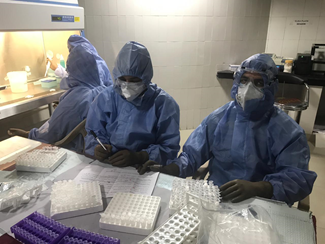 Augmenting COVID-19 testing capacity in India
Augmenting COVID-19 testing capacity in India
In the first week of February, only 14 laboratories were testing for COVID-19. By the end of March, India had 106 Virus Research & Diagnostic Laboratories (VRDLs), which anchored COVID-19 diagnosis in the country. As cases surged, new laboratories were needed to meet the demand and make testing widely available. VRDLs served as a platform for capacity building and hand hold new laboratories to come on board for COVID19 testing. The central and state governments also came together to deploy equipment and manpower to establish molecular virology laboratories.
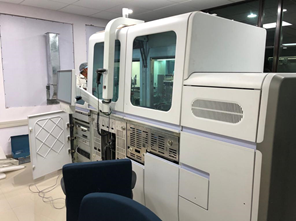
Establishing mentor institutes for upscaling testing
To rapidly expand testing facilities, 14 Centres of Excellence were set up in different Medical Institutes, as per the directives of the Union Ministers of Home and Health & Family Welfare and under the guidance of Director General, ICMR and Director, AIIMS, Delhi. These centres mentored government and private medical colleges in their catchment areas and eventually created a molecular virology laboratory network. In the initial phase, around 300 medical colleges across India were able to upscale COVID-19 testing over a fairly a short time span.
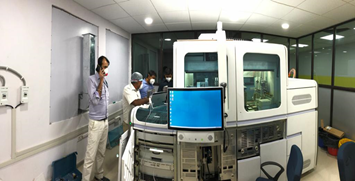 Building capacity of scientific and technical institutions
Building capacity of scientific and technical institutions
ICMR engaged with MoHFW laboratories, Council of Scientific and Industrial Research (CSIR), Department of Biotechnology (DBT), Defence Research and Development Organisation (DRDO), Indian Council of Agricultural Research (ICAR), various government medical colleges, and high-quality private laboratories to intensify testing facilities. Remote areas were mapped proactively, so that underserved areas could be adequately covered. ICMR set up molecular diagnostic laboratories in tough terrains such as Ladakh, Arunachal Pradesh, Sikkim, Tripura, Mizoram, Lakshadweep and Andaman and Nicobar Islands to ensure that no one was left behind.
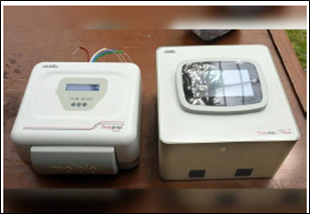 Expanding outreach through technological innovations
Expanding outreach through technological innovations
Indigenous point of care tests like TrueNat for COVID-19 testing that require minimal training, skills, infrastructure and biosafety measures were deployed for diagnosing COVID-19 at district facilities and primary health centres. Widespread availability of customized cartridges of TrueNat and CBNAAT serve as a big boost to take the COVID-19 testing to the level of the primary health care system. These tools have transformed testing rates, given their quick turnaround time (30-60 minutes).
Collaborating with private sector to boost testing capacity
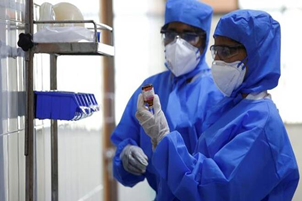
ICMR along with MoHFW onboarded certified private laboratories in India. To ensure quality, only laboratories approved by National Accreditation Board Testing and Calibration (NABL) (ISO15189) were engaged. A total of 1250 laboratories were registered with NABL for various scopes, of which labs with scope of molecular virology were chosen. Virtual laboratories tours, fast-track approvals, and other measures ensured that the laboratories established followed due diligence to safeguard quality testing and reporting of samples. By end of July, more than 400 private sector laboratories successfully came on board for testing.
Use of faster COVID-19 testing kit accelerated efforts
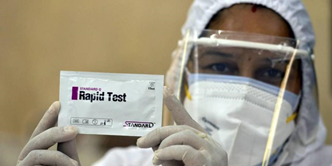 In mid-June 2020, ICMR recommended using the antigen detection test as a point-of-care diagnostic test in certain settings like hospitals and containment zones, for its minimum turnaround time of just 30-minutes including sample preparation. This provided the much-needed impetus to the government’s strategy to ‘test, track, and treat’.
In mid-June 2020, ICMR recommended using the antigen detection test as a point-of-care diagnostic test in certain settings like hospitals and containment zones, for its minimum turnaround time of just 30-minutes including sample preparation. This provided the much-needed impetus to the government’s strategy to ‘test, track, and treat’.
Safeguarding quality assurance by setting up quality control processes
ICMR identified 30 quality control (QC) laboratories to verify results of other laboratories in their respective catchment areas. Testing laboratories in each state were instructed to send positive and negative samples selected randomly to the nearest designated QC laboratories. This enabled ascertaining the quality of diagnosis. The data entry portal was developed to provide uniform laboratories result reporting and data management.
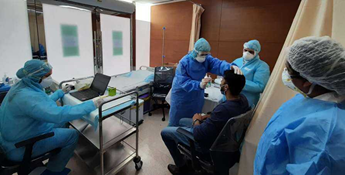 Setting up 16 validation centers to strengthen regulations around diagnostics
Setting up 16 validation centers to strengthen regulations around diagnostics
Validation centres were established and trained for evaluation of RT-PCR kits, RNA extraction kits, VTM kits and ELISA kits by standardized scientific protocol. Indigenous manufacturers were supported by various ministries and licensure procedures were fast-tracked. To ensure transparency, follow-ups and rapid approvals, an online portal for kit validation was rolled out. By mid-August, more than 700 diagnostic kits have been validated.
Instituting robust supply chain processes
Setting up robust supply chain processes right from the start has been a key enabler. A live dashboard tracked availability of essential testing commodities and support the forecasting of commodity requirements by the states. A web-based inventory management system was rolled out at the laboratory-level and standard operating procedures for effective downstream supply chain management were prepared. Robust projections for commodities and timely procurement have ensured adequate stock-at-hand to meet testing needs.
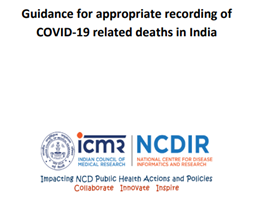
Developing advisories for testing platforms
Periodic advisories were released to expand testing platform, testing strategy as per changing epidemiology of the disease, standard laboratory protocols, and reporting guidelines such as Guidelines for COVID-19 testing in private laboratories in India; Advisory on Use of Rapid Antigen Detection Test for COVID-19; Advisory to start rapid antibody based blood test for COVID-19; and Advisory on feasibility of using pooled samples for molecular testing of COVID-19. These efforts have contributed immensely to keep all laboratories on the same page and practice uniform testing protocols.
Forging partnerships to deliver laboratory supplies
To ensure that supplies reached every laboratory in a timely manner amid the nationwide lockdown, ICMR availed the services of the Ministry of Civil Aviation and their airline partners in both the government and private sector under ‘Mission Lifeline Udan’ to deliver consignments of COVID-19 diagnostic material across the country. During the two months of complete lockdown, approximately 40 tonnes of testing material was transported in more than 150 flight operations, reaching out to the remotest corners of the nation. Doorstep deliveries were coordinated with several courier companies and state governments. As the laboratory network expanded, India Post, which has country wide operations, was also roped in to streamline and enable seamless delivery of supplies to the last mile.
Testing guides contact tracing, isolation of patients, and their proper treatment. It also pin-points where response efforts need to be directed. India has been continually tailoring its testing strategy to expand and diversify its capacity and thus enable efforts to effectively combat this pandemic.
